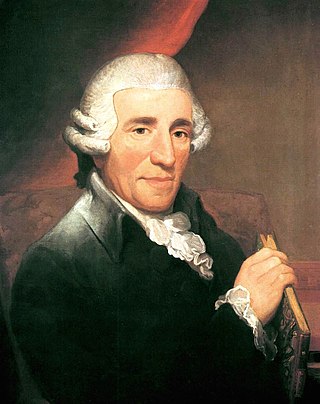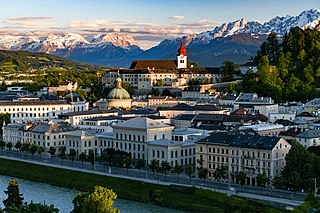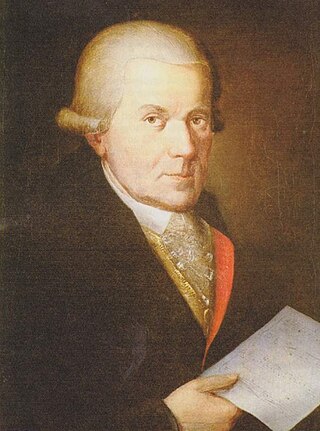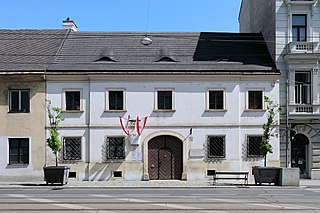
Franz Joseph Haydn was an Austrian composer of the Classical period. He was instrumental in the development of chamber music such as the string quartet and piano trio. His contributions to musical form have led him to be called "Father of the Symphony" and "Father of the String quartet".

{{Infobox settlement | name = Salzburg | native_name = | official_name = | settlement_type = Statutory city

Johann Michael Haydn was an Austrian composer of the Classical period, the younger brother of Joseph Haydn.

Braunau am Inn is a town in Upper Austria on the border with Germany. It is known for being the birthplace of Adolf Hitler.

Eisenstadt is the capital city of the Austrian state of Burgenland. With a population of 15,074, it is the smallest state capital and the 38th-largest city in Austria overall. It lies at the foot of the Leitha Mountains hill range.

NicolaAntonio Giacinto Porpora was an Italian composer and teacher of singing of the Baroque era, whose most famous singing students were the castrati Farinelli and Caffarelli. Other students included composers Johann Adolph Hasse, Matteo Capranica and Joseph Haydn.

Albert Christoph Dies was a German painter, engraver, and biographer most noted for his biography of Joseph Haydn, although it is now considered sentimental and not entirely accurate. As an artist, he is also not very well-regarded.

The House of Esterházy, also spelled Eszterházy, is a Hungarian noble family with origins in the Middle Ages. From the 17th century, the Esterházys were the greatest landowner magnates of the Kingdom of Hungary, during the time that it was part of the Habsburg monarchy and later Austria-Hungary. During the history of the Habsburg Empire, the Esterházy family was consistently loyal to the Habsburg rulers. The Esterházys received the title of Graf (Count) in 1626, and the Forchtenstein line received the title of Fürst (Prince) from the Holy Roman Emperor in 1712.
Rohrau is a village in the state of Lower Austria. The name comes from two German words: Rohr (reed) and Au. South of the village is a riparian forest and a swamp covered with reed.

Hainburg an der Donau is a town located in the Bruck an der Leitha district in the state of Lower Austria of eastern Austria. In 2021 it had a population of about 7,000.
Georg Matthias Monn was an Austrian composer, organist and music teacher whose works were fashioned in the transition from the Baroque to Classical period in music.

Aloys Thomas Raimund, Count von Harrach zu Rohrau was an Austrian politician and diplomat.
Mathias Haydn was the father of two famous composers, Joseph and Michael Haydn. He worked as a wheelwright in the Austrian village of Rohrau, where he also served as Marktrichter, an office akin to village mayor.

Mannersdorf am Leithagebirge is a town in Austria. It is located in the district of Bruck an der Leitha in the state of Lower Austria. Mannersdorf is seated at the base of a range of wooded hills called the Leitha Mountains (Leithagebirge), from which it receives its full name. It overlooks an agricultural plain, through which flows the Leitha River, about two miles away.

Count Karl Joseph of Morzin (1717–1783) was a Bohemian aristocrat from the Morzin family, remembered today as the first person to employ the composer Joseph Haydn as his Kapellmeister, or music director. The first few of Haydn's many symphonies were written for the Count.

Mozart's birthplace is the birthplace of Wolfgang Amadeus Mozart at No. 9 Getreidegasse in Salzburg, Austria. The Mozart family resided on the third floor from 1747 to 1773. Mozart himself was born here on 27 January 1756. He was the seventh child of Leopold Mozart, who was a musician of the Salzburg Royal Chamber.

The Liszthaus Raiding is the building where Franz Liszt was born in 1811 which has been a museum since 1979. It is located in Raiding, a town in Burgenland province of Austria.

The Pleyel Museum is in Ruppersthal, a village near the town of Großweikersdorf in Lower Austria. It is the birthplace of the composer, piano manufacturer and music publisher Ignaz Pleyel (1757–1831), and is now dedicated to his life and work.

Schubert's birthplace, in Vienna, Austria, was the birthplace in 1797 of the composer Franz Schubert. Today it is a museum, part of the Vienna Museum.

















